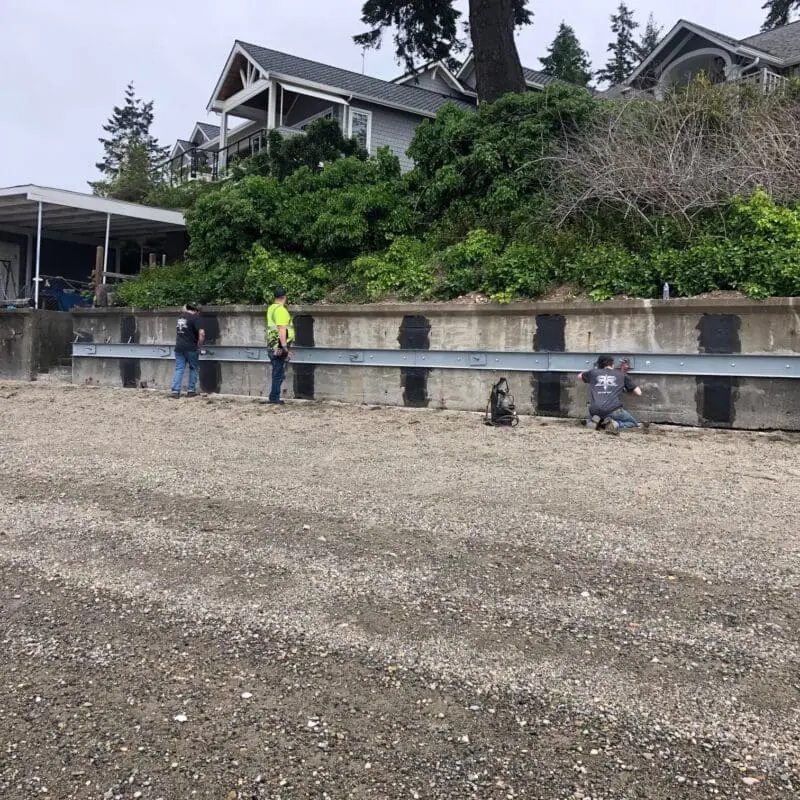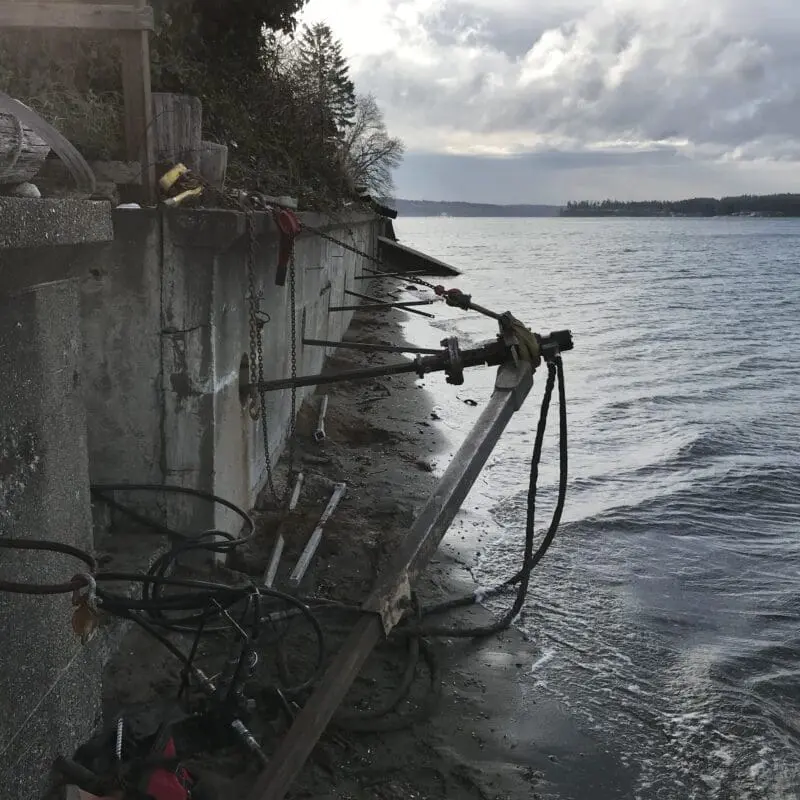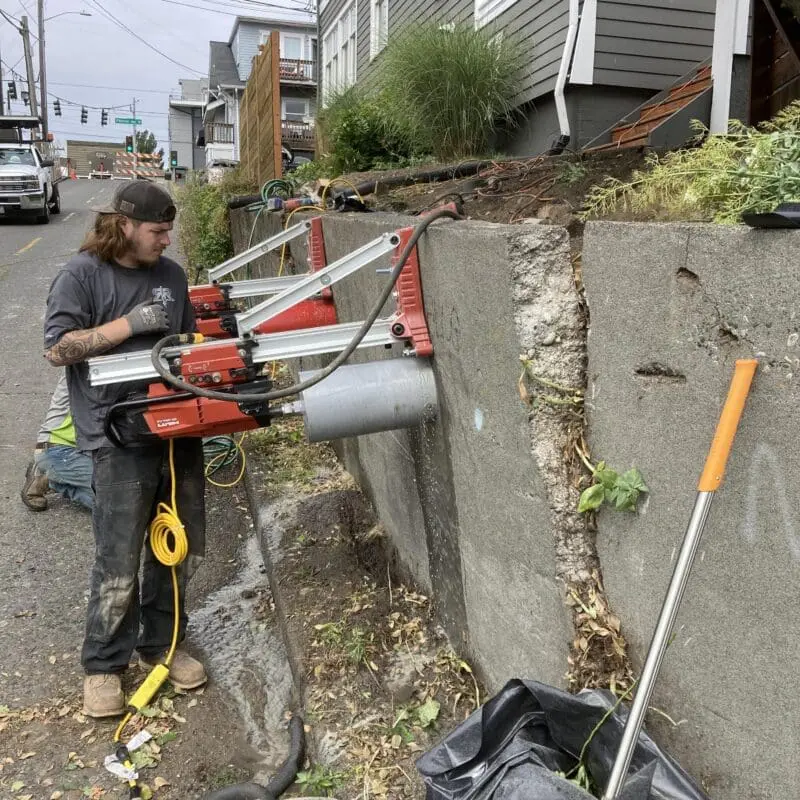Retaining Wall & Seawall Repair
Retaining wall and seawall repair involves fixing or reinforcing walls that retain soil or water, typically due to erosion or structural damage.
Retaining wall and seawall repair involves fixing or reinforcing walls that retain soil or water, typically due to erosion or structural damage.
The lateral pressures of soil can damage your retaining wall, no matter how strong it is. You might see your walls tilting, separating from adjoining walls, buckling or cracking in certain spots.
There are numerous reasons why a retaining wall may need to be repaired or replaced – including its age, the materials used to originally construct the wall, poor installation or design for the initial build, stress factors around the area, and drainage. In order to make sure your time and money are properly invested, it’s important to find an experienced contractor to replace or repair your retaining wall. R&R will ensure to avoid issues of failing and collapsing walls, as the soil produces pressure on it.
Carbon fiber reinforcement can be a very effective means to reinforce, stabilize, and repair damaged or deteriorated retaining walls. In order to effectively stop movement in a retaining wall, “restraint” has to be provided. For instance, if a wall is tipping and carbon fiber straps are added, the wall could still continue to tip but would do so as one reinforced section. If tiebacks or other means of securing the top of the wall are provided, then the carbon fiber will resist any movement between the tiebacks and the backfill restraining the base of the wall.
Since the carbon fiber is ultra thin at less than 1/8″ thick, the overall finished appearance can have a very low aesthetic impact once the wall is coated or painted. Specialty exterior paints provide sufficient concealment of the carbon fiber, however some clients may prefer to parge coat the wall for a complete uniform appearance that blends in with the existing concrete finishes.
If you have noticed signs of cracking or structural damage on your retaining wall, contact our team today for a free, no-obligation assessment for your retaining wall repair!
The structural integrity of your seawall is critical to the preservation of your shoreline. Our aim is to inspect your seawall to determine if repairs are necessary and look for signs of structural deterioration. During our inspection, our design specialists are trained to look for cracks, corrosion, rotation, upland settlement, and soil loss. While some hairline cracks caused by seasonal temperature and environmental fluctuations are common and not a cause for concern, cracks that are deep and wide indicate a possible problem.

Tie backs
High-risk areas of your seawall can be strengthened using Carbon Fiber, Steel C Channel, and heavy-duty steel tie-backs. Our steel tie-backs firmly anchor the seawall to load-bearing soil and prevent the wall from tipping or leaning.

The saltwater marine environment is an extremely corrosive one thanks to the effects of salt water. Due to this factor, composite materials such as carbon fiber are a great fit for maritime applications because of their natural corrosion resistance vs alternative strengthening materials such as steel.
To protect the carbon fiber and address the environmental factors in the water, such as logging debris from winter storms, a hybrid Epoxy/Kevlar marine coating should be applied to the entire seawall, providing a uniform finish while protecting the carbon fiber straps. This is just one example of the innovative repair solutions R&R has developed for the preservation of seawalls and concrete infrastructure along the coastal waters of Western Washington.

Signs of seawall damage that should be inspected by a professional:
These could all be signs that structural damage is most likely present and your seawall is in need of repair. Get in touch with us today to schedule your no obligation free estimate.
Typically, because of age and erosion, and just like much of the concrete along the coastal waters of Western Washington and the Puget Sound, most traditional construction materials eventually fail.
Since seawalls are built on the shorelines of our coastal waterways, beaches, and lakes, the potential for foundation shifting is greater – this factor makes cracks in the cement cap or face of a seawall a much more serious matter. Winter storms put pressure on seawall construction no matter if you’re in the Puget Sound or near an area lake or river. Storms accelerate erosion just by moving water back and forth at the base of the seawall, stealing material from under it, just as it decimates the sand on local beaches.
In most cases this either means that your wall tiebacks have failed (often due to corrosion) or that your seawall is eroding at its foundation. It’s another sign that you need work done – and quickly.
To prevent the wall from leaning further toward the water, R&R installs heavy duty helical wall anchors and tiebacks that are buried in stable soils and affixed to the face of your seawall to prevent further movement.
"*" indicates required fields